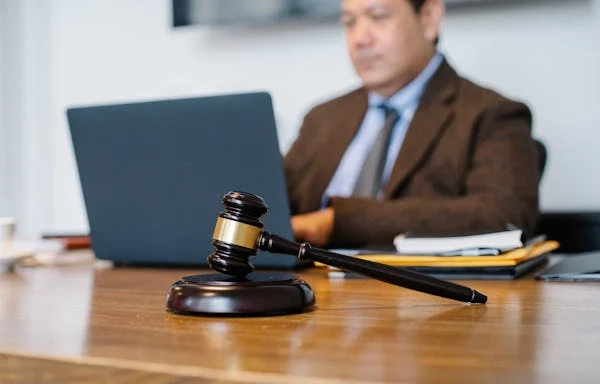Financial struggles can be overwhelming, and when debt spirals out of control, bankruptcy might seem like the only solution. Navigating this complex legal process can be daunting, and this is where a bankruptcy lawyer comes into play. In this article, we’ll cover everything you need to know about bankruptcy lawyers and how they can help you regain control of your financial future.
Introduction To Bankruptcy Law
What Is Bankruptcy?
Bankruptcy is a legal process that helps individuals or businesses that can’t repay their debts. By declaring bankruptcy, you either liquidate your assets to pay off creditors or create a repayment plan. There are different types of bankruptcy, depending on your financial situation and the nature of your debt.
The Role Of A Bankruptcy Lawyer
A bankruptcy lawyer is a legal professional who specializes in helping people through the bankruptcy process. They provide guidance, handle legal paperwork, and represent clients in court. Without proper legal advice, filing for bankruptcy can become a legal and financial nightmare, which is why having a lawyer is crucial.
Types Of Bankruptcy
Chapter 7 Bankruptcy
Chapter 7, often called “liquidation bankruptcy,” is where non-exempt assets are sold to pay off creditors. It’s usually for individuals with little to no disposable income. Once the assets are liquidated, most remaining debts are discharged, providing a fresh start.
Chapter 13 Bankruptcy
This type of bankruptcy is often used by individuals with a steady income who want to reorganize their debt. Chapter 13 allows you to keep your assets while setting up a repayment plan over 3 to 5 years. It’s ideal for those who want to avoid foreclosure or repossession.
Chapter 11 Bankruptcy
Chapter 11 is designed for businesses that need to restructure their debt to stay operational. It provides an opportunity to reorganize finances while continuing day-to-day operations. Although rare for individuals, it can apply in certain high-debt cases.
Differences Between Personal And Business Bankruptcy
Personal bankruptcies typically fall under Chapter 7 or Chapter 13, while businesses often file under Chapter 11. The main difference is that personal bankruptcy focuses on individual debts, whereas business bankruptcy deals with corporate obligations and business continuity.
When To Hire A Bankruptcy Lawyer
Signs You Need A Bankruptcy Lawyer
If you’re unable to keep up with debt payments, facing creditor lawsuits, or considering foreclosure, it may be time to hire a bankruptcy lawyer. Other signs include wage garnishments or mounting credit card debt.
Personal vs. Business Situations
Individuals and businesses have different financial obligations, and the decision to hire a bankruptcy lawyer can vary. Personal bankruptcy focuses on protecting your home and personal assets, while business bankruptcy deals with saving your business.
Self-Representation vs. Legal Expertise
While it’s possible to represent yourself in bankruptcy court, it’s risky. Bankruptcy laws are complex, and a small mistake in the filing process could lead to dismissal or severe financial consequences. A bankruptcy lawyer ensures that everything is handled correctly.
How A Bankruptcy Lawyer Helps You
- Expert Knowledge of Bankruptcy Law Bankruptcy lawyers understand the nuances of the law and can guide you through the legal process, ensuring that you make informed decisions. Their knowledge helps you avoid errors that could lead to your case being dismissed or delayed.
- Asset Protection One of the main concerns when filing for bankruptcy is the potential loss of assets. A bankruptcy lawyer will help you understand the exemptions available in your state, ensuring that you keep as much of your property as possible.
- Peace of Mind Bankruptcy can be stressful, but a lawyer can ease this burden by handling the complex paperwork, negotiations with creditors, and representation in court. This allows you to focus on rebuilding your life, knowing that your legal matters are in good hands.
- Better Debt Negotiations Lawyers are skilled negotiators who can work with creditors to reduce your debt or arrange more favorable repayment terms. This can make a significant difference in the overall financial impact of your bankruptcy.
- Increased Chances of a Successful Outcome Filing for bankruptcy without legal help increases the risk of making mistakes that could cost you time, money, or the discharge of your debts. A bankruptcy lawyer improves your chances of a smooth process and the best possible financial outcome.
The Bankruptcy Process Explained
Filing For Bankruptcy
The first step in the bankruptcy process is filing a petition with the court. This includes submitting forms that list your assets, liabilities, income, and expenses. Your bankruptcy lawyer will guide you through this process and ensure that everything is filed correctly.
Bankruptcy Counselling And Education
Before filing, you’ll be required to complete credit counselling. After your case is filed, you must complete a debtor education course. These programs help you understand your financial situation and teach you how to manage money moving forward.
Meeting Of Creditors
Once your bankruptcy is filed, you’ll attend a “341 meeting” where creditors can ask questions about your financial situation. Your bankruptcy lawyer will be present to ensure the process goes smoothly and that your rights are protected.
The Discharge Process
At the end of your bankruptcy case, eligible debts are discharged, meaning you’re no longer legally required to pay them. A bankruptcy lawyer ensures that all dischargeable debts are eliminated, giving you a fresh financial start.
Bankruptcy Lawyer Fees And Costs
Typical Bankruptcy Lawyer Fees
The cost of hiring a bankruptcy lawyer varies, but typical fees range from $1,000 to $3,500, depending on the complexity of your case. Chapter 7 cases are generally less expensive than Chapter 13 due to the simpler process.
Factors Affecting Costs
Several factors can influence how much you pay for a bankruptcy lawyer, including the lawyer’s experience, your location, and the complexity of your financial situation.
Affordable Options And Payment Plans
Many bankruptcy lawyers offer payment plans to make their services more affordable. Some may also offer a free initial consultation to discuss your case and provide you with an estimate of costs.
Finding the Right Bankruptcy Lawyer
Key Qualities To Look For
When searching for a bankruptcy lawyer, look for someone with experience, good communication skills, and a solid track record of successful cases. It’s also important to find someone who makes you feel comfortable and confident.
Questions To Ask During Consultations
Before hiring a lawyer, ask questions like:
- How many bankruptcy cases have you handled?
- What’s your success rate?
- Do you offer payment plans?
- What is the likely outcome for my case?
Checking Credentials And Reviews
Always check online reviews and the lawyer’s credentials. Make sure they are licensed to practice in your state and have a good reputation among past clients.
The Legal Implications Of Filing For Bankruptcy
Impact On Your Credit Score
Filing for bankruptcy will lower your credit score significantly, and the bankruptcy will stay on your credit report for 7 to 10 years. However, over time, you can rebuild your credit by practicing good financial habits.
Rebuilding Your Financial Future
After bankruptcy, it’s important to create a financial plan to avoid future debt problems. This can include budgeting, saving, and using credit responsibly.
Bankruptcy And Your Assets
Depending on the type of bankruptcy, you may lose some of your assets. A bankruptcy lawyer will help you determine which assets are protected and guide you through exemptions that apply in your case, ensuring that you retain as much of your property as possible.
Common Misconceptions About Bankruptcy
Myth 1: Bankruptcy Will Ruin Your Life
One common misconception is that filing for bankruptcy will permanently destroy your financial future. While bankruptcy does have a significant impact, it is often a temporary setback. Many people successfully rebuild their credit and financial standing after filing for bankruptcy, using it as a fresh start.
Myth 2: You’ll Lose Everything
Another myth is that filing for bankruptcy means you’ll lose all of your assets. In fact, bankruptcy exemptions allow you to keep certain essential assets like your home, car, and retirement accounts. The goal of bankruptcy is to help you get back on your feet, not to strip you of everything.
Myth 3: It’s A Sign Of Personal Failure
Many people view bankruptcy as a personal failure, but it’s actually a legal tool designed to provide relief from overwhelming debt. Life events like medical emergencies, job loss, or economic downturns can lead to financial hardships that are beyond your control.
Alternatives To Bankruptcy
Before filing for bankruptcy, it’s worth exploring other debt-relief options that may suit your situation better.
Debt Settlement
In debt settlement, you negotiate with creditors to pay off your debt for less than the full amount. This can be an effective way to reduce debt without the long-term impact on your credit score that bankruptcy brings. However, it can still negatively affect your credit in the short term.
Debt Consolidation
Debt consolidation involves combining multiple debts into one loan with a lower interest rate. This can make managing your debt easier and more affordable. A bankruptcy lawyer can help you explore whether this option might be viable for your situation.
Credit Counselling
Credit counselling services offer financial advice and help you create a plan to pay down your debt. Some services even negotiate on your behalf with creditors to reduce interest rates or monthly payments.
How To Prepare Or Your First Meeting With A Bankruptcy Lawyer
What Documents To Bring
Before meeting with your bankruptcy lawyer, gather important financial documents. These include:
- Recent pay stubs
- Tax returns from the past two years
- Bank statements
- A list of debts and assets
- Credit card and loan statements
- Any legal notices from creditors
Key Questions To Ask
During your consultation, ask questions to understand the bankruptcy process and your options, such as:
- Which type of bankruptcy should I file for?
- What can I expect during the process?
- How long will the process take?
- What are the potential outcomes for my case?
What To Expect
Your first meeting with a bankruptcy lawyer is an opportunity to get a clear picture of your financial situation. The lawyer will review your documents, ask questions, and provide legal advice tailored to your case.
The Emotional Impact Of Filing For Bankruptcy
Coping With Stress And Anxiety
Filing for bankruptcy can be an emotionally overwhelming experience. Many people feel anxiety, shame, or even guilt. It’s important to remember that bankruptcy is a legal remedy to financial challenges and does not define your worth. Seeking emotional support from friends, family, or a counsellor can help you cope with the stress.
How Bankruptcy Lawyers Provide Emotional Support
Beyond the legal assistance, a good bankruptcy lawyer provides emotional support by helping clients feel reassured during this difficult time. They handle the complexities of the case, allowing you to focus on your personal well-being.
The Future After Bankruptcy
Steps To Rebuild Your Credit
After bankruptcy, it’s essential to take steps to rebuild your credit. Start by obtaining a secured credit card or a small loan and make timely payments. Over time, these responsible credit habits will improve your credit score.
Financial Planning For The Future
Bankruptcy offers a clean slate, but it’s important to learn from past mistakes. Create a budget, save for emergencies, and live within your means to avoid falling into debt again. A financial planner or advisor can help you set realistic goals and stick to them.
Bankruptcy Laws And Regulations In Different States
Variations In State Laws
Bankruptcy laws vary from state to state, particularly when it comes to exemptions and what property you’re allowed to keep. Some states have generous homestead exemptions, while others do not. A local bankruptcy lawyer will be familiar with the specific laws in your state and can guide you accordingly.
How A Local Bankruptcy Lawyer Helps
Hiring a lawyer who practices in your state ensures that they understand the local laws and court procedures. They can offer the best advice on how to file for bankruptcy and maximize your chances of keeping essential assets.
Frequently Asked Questions About Bankruptcy Lawyers
- Do I really need a bankruptcy lawyer? While it’s possible to file for bankruptcy on your own, the process is complex, and small mistakes can have big consequences. A bankruptcy lawyer ensures that everything is done correctly, improving your chances of a successful case.
- How long does the bankruptcy process take? The length of the bankruptcy process depends on the type of bankruptcy you file. Chapter 7 typically takes 4 to 6 months, while Chapter 13 can last 3 to 5 years due to the repayment plan.
- Will filing for bankruptcy stop creditors from harassing me? Yes, once you file for bankruptcy, an automatic stay goes into effect, which temporarily stops most creditors from contacting you, filing lawsuits, or taking other collection actions.
- What happens to my credit score after bankruptcy? Your credit score will likely drop significantly after filing for bankruptcy, but over time, you can rebuild it by practicing good financial habits, such as paying bills on time and using credit responsibly.
Conclusion:
Filing for bankruptcy can be an overwhelming and emotionally taxing process. However, it’s also an opportunity for a fresh financial start, a way to shed overwhelming debt and rebuild your life. Bankruptcy lawyers play a crucial role in ensuring that this process goes as smoothly as possible, from filing the correct documents to protecting your assets and negotiating with creditors. With their expert guidance, you can avoid costly mistakes, maximize exemptions, and ensure the best possible outcome for your case.
Bankruptcy laws are complex and vary by state, making legal advice essential. Whether you’re considering Chapter 7 liquidation or Chapter 13 reorganization, an experienced bankruptcy lawyer can provide you with tailored advice, help you navigate the legal system, and protect your financial future.
Read Also:
Business Factoring Companies: A Comprehensive Guide to Streamlining Your Cash Flow
Seven kinds of partners you may know
Professional Estate Planning Lawyer 2025



